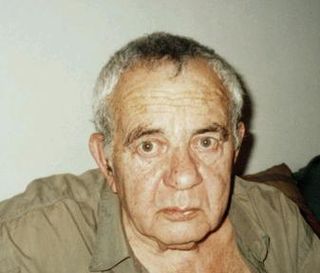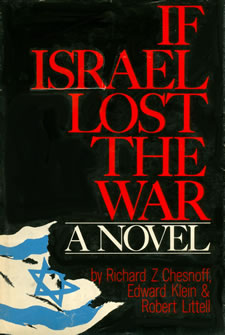
Rosh HaAyin is a city in the Central District of Israel. In 2022, it had a population of 73,678.

Baruch Meir Marzel is an Israeli politician and activist. He is an Orthodox Jew originally from Boston who now lives in the Jewish community of Hebron in Tel Rumeida with his wife and nine children. He was the leader of the far-right-oriented Jewish National Front party. He is now a member of Otzma Yehudit. He was the "right-hand man" of assassinated Rabbi Meir Kahane, acting as spokesman for the American-born rabbi's Kach organization for ten years. The mainstream Israeli press has described him as an "extreme right-wing activist".

Isser Harel was spymaster of the intelligence and the security services of Israel and the Director of the Mossad (1952–1963). In his capacity as Mossad director, he oversaw the capture and covert transportation to Israel of Holocaust organizer Adolf Eichmann. Harel was the only individual in the history of the State of Israel to hold a position that consolidated both internal and external intelligence responsibilities.

Yonatan Ratosh was the literary pseudonym of Uriel Shelach, an Israeli poet and journalist who founded the Canaanite movement.

Sdot Micha Airbase is an Israeli Air Force (IAF) missile base and depot, whose existence Israel neither confirms nor denies. It is situated in the center of Israel, halfway from Jerusalem to the Mediterranean Sea and extends nearly 13 km from southeast to northwest. The center of the base is located 1.5 km north of moshav Sdot Micha and it has neither a runway nor a visible heliport. Its facilities can now be clearly seen on satellite images. Nuclear warheads are supposed to be stored at the base, which can also be fired by the missiles there.

Amos Kenan, also Amos Keinan, was an Israeli columnist, painter, sculptor, playwright and novelist.
Meri was a minor radical left-wing political party in Israel. It was founded in the 1960s as HaOlam HaZeh – Koah Hadash by Uri Avnery, editor of HaOlam HaZeh.
Censorship in Israel is officially carried out by the Israeli Military Censor, a unit in the Israeli government officially tasked with carrying out preventive censorship regarding the publication of information that might affect the security of Israel. The body is headed by the Israeli Chief Censor, a military official appointed by Israel's Minister of Defense, who bestows upon the Chief Censor the authority to suppress information he deems compromising from being made public in the media, such as Israel's nuclear weapons program and Israel's military operations outside its borders. On average, 2240 press articles in Israel are censored by the Israeli Military Censor each year, approximately 240 of which in full, and around 2000 partially.
The Bus 300 affair, also known as Kav 300 affair, was a 1984 incident in which Shin Bet members executed two Palestinian bus hijackers, immediately after the hostage crisis incident ended and they had been captured.

David Rubinger was an Israeli photographer and photojournalist. His famous photo of three Israeli paratroopers after the recapture of the Western Wall has become an iconic image of the Six-Day War. Shimon Peres called Rubinger "the photographer of the nation in the making".

Shalom Cohen was an Israeli politician who served as a member of the Knesset between 1969 and 1974.
Semitic Action was a small Israeli political group of the 1950s and 1960s which sought the creation of a regional federation encompassing Israel and its Arab neighbors.

If Israel Lost the War is a 1969 alternate history political novel written jointly by Robert Littell, Richard Z. Chesnoff and Edward Klein.
Tikun Olam is a Seattle-based political blog that regularly reports on Israeli security matters. The blog was created in 2003 by Richard Silverstein and covers the Arab–Israeli conflict. Silverstein describes it as a "liberal Jewish blog" that "focuses on exposing the excesses of the Israeli national security state".

Canaanism was a cultural and ideological movement founded in 1939, reaching its peak among the Jews of Mandatory Palestine during the 1940s. It has had a significant effect on the course of Israeli art, literature and spiritual and political thought. Its adherents were called Canaanites. The movement's original name was the Council for the Coalition of Hebrew Youth or less formally, the Young Hebrews; Canaanism was originally a pejorative term. It grew out of Revisionist Zionism and had roots in European extreme right-wing movements, particularly Italian fascism. Most of its members were part of the Irgun or Lehi.
The Israeli Communist Opposition, commonly known by its Hebrew acronym Aki (אק"י), was a small communist organization in Israel. The group was founded in 1973 by former Knesset member Esther Vilenska after she left Maki.

Uri Avnery was a German-born Israeli writer, journalist, politician, and activist, who founded the Gush Shalom peace movement. A member of the Irgun as a teenager and a veteran of the 1948 Palestine war, Avnery sat for two terms in the Knesset from 1965 to 1974 and from 1979 to 1981. He was also the owner and editor of the news magazine HaOlam HaZeh from 1950 until its closure in 1993.

Sara Rina Ben-Menahem was an Israeli writer, author of the first Hebrew language book to describe the homosexual and lesbian scene in Israel, "הדווקאים", published in 1960, and the first Hebrew lesbian novel, "הצלע", published in 1961.
Haim Hanegbi (1935–2018) was a Palestinian Jewish leftist political activist. He was a journalist and writer and a cofounder of the dissident group Matzpen.













